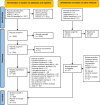Efficacy of neurostimulation across mental disorders: systematic review and meta-analysis of 208 randomized controlled trials
- PMID: 35365806
- PMCID: PMC8973679
- DOI: 10.1038/s41380-022-01524-8
Efficacy of neurostimulation across mental disorders: systematic review and meta-analysis of 208 randomized controlled trials
Abstract
Non-invasive brain stimulation (NIBS), including transcranial magnetic stimulation (TMS), and transcranial direct current stimulation (tDCS), is a potentially effective treatment strategy for a number of mental conditions. However, no quantitative evidence synthesis of randomized controlled trials (RCTs) of TMS or tDCS using the same criteria including several mental conditions is available. Based on 208 RCTs identified in a systematic review, we conducted a series of random effects meta-analyses to assess the efficacy of NIBS, compared to sham, for core symptoms and cognitive functioning within a broad range of mental conditions. Outcomes included changes in core symptom severity and cognitive functioning from pre- to post-treatment. We found significant positive effects for several outcomes without significant heterogeneity including TMS for symptoms of generalized anxiety disorder (SMD = -1.8 (95% CI: -2.6 to -1), and tDCS for symptoms of substance use disorder (-0.73, -1.00 to -0.46). There was also significant effects for TMS in obsessive-compulsive disorder (-0.66, -0.91 to -0.41) and unipolar depression symptoms (-0.60, -0.78 to -0.42) but with significant heterogeneity. However, subgroup analyses based on stimulation site and number of treatment sessions revealed evidence of positive effects, without significant heterogeneity, for specific TMS stimulation protocols. For neurocognitive outcomes, there was only significant evidence, without significant heterogeneity, for tDCS for improving attention (-0.3, -0.55 to -0.05) and working memory (-0.38, -0.74 to -0.03) in individuals with schizophrenia. We concluded that TMS and tDCS can benefit individuals with a variety of mental conditions, significantly improving clinical dimensions, including cognitive deficits in schizophrenia which are poorly responsive to pharmacotherapy.
© 2022. The Author(s).
Conflict of interest statement
The authors declare no competing interests.
Figures
References
Publication types
MeSH terms
LinkOut - more resources
Full Text Sources
Medical


